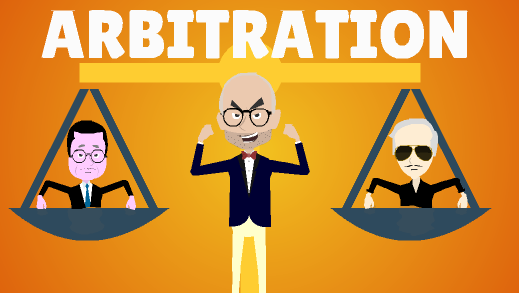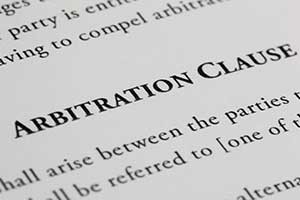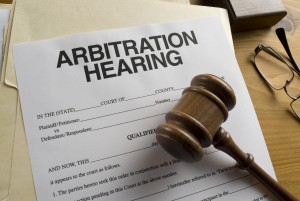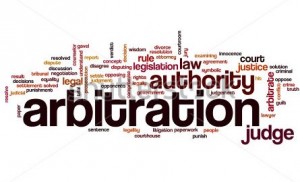In this blog post, Abhiraj Thakur, a student of NALSAR University of Law, Hyderabad writes about implication of arbitration in consumer contracts and goes on to explain about the development of laws and authorities in the field of arbitration in India.
What are Consumer Contracts?
A sub-type of standard form contracts, a consumer contract is a contract with the provider of a good or service with the consumer of that particular good or service. In the capitalist domination prevailing today, distortions in trade in the form of long and exhaustive litigation procedure to settle disputes is undesirable.
Why Arbitration?
We witnessed in our country a paradigm shift in the area of arbitration after the enactment of The Arbitration and Conciliation Act, 1996. Today, due to new liberal policies and sustained efforts by the Government since 1991, India has opened up to FDIs, FIIs, and international trade in varied industries and sectors of its economy. But this has been unwarrantedly accompanied by a significant upheaval in the number of commercial disputes involving both indigenous and foreign participants. The scenario gets complicated further with the use of technology in all aspects of business transactions. These are the major factors that have led to a considerable increase in the number of arbitration cases. Historically, the awareness and reliance on alternate dispute resolution as a solution was very low. However, the recent increase in the number of cases, positive results, and Government support has motivated companies to consider arbitration as an approach to resolve disputes. ADR is fast gaining preference among the companies to resolve disputes between other commercial entities as well as with their Consumers.[1]Being contracts of adhesion, the consumer contracts invariably have clauses resorting to arbitration in case of disputes.
Consumer Contracts in Services Sector
In the standard form of contracts embraced by the administration offices like the Central Public Works Department (CPWD), Military Engineer Services (MES)[2] railroads and open undertakings, in spite of the fact that an arbitration clause might incorporate inside of its domain all the conceivable questions identifying with the exchange, there are ‘exception clauses or avoidance conditions’ that settle on the choice of an authority named in the understanding, last and tying on the gatherings. These clauses are incorporated in light of the fact that in development contracts, circumstances emerge for which prompt choices on a state of distinction or question is required to stay away from excessive deferrals. In these circumstances, the ‘exception clauses’ or ‘avoidance provisos’ settle on the choice of a specific power last and tying on both the gatherings and not subject to Arbitration. This makes the situation of individual contractors very vulnerable as the companies that provide construction materials often exploit such practices. A large number of such companies have been the subject of arbitration proceedings in the recent years.
Judiciary and Arbitration in Consumer Contracts
There has been a progression of legal verdicts which have held that if a specific matter has been rejected from the domain of intervention joining exception clauses, the same should not be re-fomented in Arbitral proceedings. One such is the case of Food Corporation of India v Sreekanth Transport.[3] The Supreme Court held that ‘excepted matters’ don’t require any further mediation, since the understanding itself gives a named adjudicator, and simultaneous acceptance by the gatherings to the choice of the appointed arbitrator is clearly assumed because of unequivocal acknowledgment of the terms of the agreement of the gatherings.
These accompanying clauses can likewise work in an unexpected way. There might be provisions in the agreement which enable either the architect in-control or the advisor to take an on-the-spot choice on purposes of a distinction between the individual developer and the business company. Such conditions additionally give a privilege to a prevalent officer within a specific time and force a risk on the officer to give a choice within that stipulated time. The clause further refers of the matter to Arbitration on the off chance that one of the gatherings is not fulfilled by such choice, or the officer does not render a viable choice. Be that as it may, these provisos explicitly provide that if none of the sides pick the decision to refer the matter to arbitration within the time limit thus prescribed, the decision last rendered shall be treated as final and both the parties shall be bound by it.
Steps Taken to improve the scope of Arbitration
The Dispute Review Boards (DRBs)
The idea of a Dispute Review Board (DRB) is very commonplace in the real estate business. The DRB is a board of three experienced and fair-minded analysts. The DRB is constituted before development starts and occasionally meets at the employment site. The DRB individuals are kept abreast with the advancements in the occupation and made acquainted with the venture techniques and the members, and are furnished with the contract arrangements and determinations undertaken by the parties. The DRB meets with the business company and the temporary workers of the contractor delegates amid customary site visits and supports the determination of debate at the occupational level. The DRB tries to take care of issues before they escalate into real questions.
The proceedings of the DRB can be brought as proof before an arbitral tribunal or other legal discussion. The board individuals could likewise be exhibited as witnesses. The proposal made by the three specialists known for their experience, acknowledged by both the gatherings toward the beginning of the work as impartial persons and having exhaustive information of the venture won’t regularly be changed by any such tribunal. On this thought, due acknowledgment is given to the framework around the world, and no case goes up to mediation. Thus, these clauses further enforce restraint on free and fair arbitration.
The Industry Arbitration Council
The development business felt the need to adopt new measures for the purpose of resolving question in a reasonable, quick and cost-proficient way. Because of such prerequisites, the Construction Industry Development Council, India (CIDC), in participation with the Singapore International Arbitration Centre (SIAC), set up an Arbitration Centre in India called the Construction Industry Arbitration Council (CIAC).[4] This sort of foundation directed procedure clearly generated favourable circumstances over Ad-hoc Arbitration for development organizations, open segment endeavours, and government offices that have development contracts. The pertinent question now is how will the DRB be formed and are they neutral? In most cases, they favour the business company which makes the situation worse for the other party.
Problems in Enforcement of Arbitral Awards
- The aforementioned arbitration clauses make enforcement very difficult in the commercial arena, especially real estate. An Arbitral Award under the 1996 Act cannot be enforced as a Decree till the period of challenge under Sec. 34 (3) is over or the objections filed have been dismissed. It is also common practice that whenever an Arbitral Award is made, the party adversely affected by it files a petition u/s 34 of the Act in the Court and the Court issues notice.[5] Then, till the time this objection petition is dismissed, the said award cannot be enforced. Given the delays in our judicial system, it almost takes years for the Objection Petition to be disposed of and until such time, the party having the arbitral award in its favour remains in limbo. Thus, the laudable objective behind doing away of legal proceedings to make the arbitral award a Rule of Court under the 1940 Act by introducing Sec.36 in the 1996 Act has been diluted to a great extent.
- The Execution procedure laid down in Order XXI of CPC is lengthy, complex and time-consuming and almost a never ending story, the consequence of which is blocked capital.[6]
- In many cases it has been observed that during filing, the party adversarial to the award disposes of its assets in a clever manner. This is done to defeat the execution proceedings. So there exists a huge possibility that by the time a party takes interim orders u/s 9 of the Act against disposal of assets etc., the judgment debtor would have practically spirited away all its assets.[7]
To Conclude, the Parliament has sanctioned the Arbitration and Conciliation Act with the objective of giving expedient remedy by assertion and to accomplish this goal, area 5 is the of the Act serves as the greatest safeguard for Arbitration. It puts a complete bar on the intervention of the courts in matters where there exists an Arbitration clause.[8] Arbitration carries with it the gravity and absolution of the legal process and couples it with the procedural adaptabilities of non-routine problem determination strategies. There is, in any case, a just need to spare the consumers from notorious clauses in India. Yet above all, the need of the hour is to effect an adjustment in discernments. As our country moves towards expanding litigiousness, elective techniques for dispute resolution may very well give way to solving the issues of overburdened case loads, the long pendency of cases and a very negligible instance of equity and justice being postponed.
[1]Venture Global engineering v Satyam Global Computer Services Ltd. on 10th January 2008 CASE No.: Appeal (Civil) 309 of 2008, AIR 2008 SC 1061
[2]Military Engineer Services (MES) is one of the largest government construction agencies in India and provides works cover to army, navy and air force.
[3](1999) 4 SCC 491
[4]CIAC is a Registered Society with its central command in New Delhi. Assertion under the support of the CIAC has the accompanying elements: (i) tight courses of events for arrangement of judges and for rendering of the honor; (ii) prepared referees comprising of experts from the development business and also the lawful organization; (iii) strict codes of morals for authorities
[5]S.K. Dholakia, ‘Analytical Appraisal of the Arbitration and Conciliation (Amendment) Bill, 2003’, ICA’s Arbitration Quarterly, ICA, 2005, vol. XXXIX/No.4 at p 23.
[6] Ibid
[7]RajinderKrishanKhanna vs. Union of India (1998) 7 SCC 129
[8]Oil & Natural Gas Corporation Ltd v Saw Pipes Ltd on 17 April, 2003 CASE NO.: Appeal (civil) 741 2001 of 518, AIR 2003 SC 2629
 Serato DJ Crack 2025Serato DJ PRO Crack
Serato DJ Crack 2025Serato DJ PRO Crack













 Allow notifications
Allow notifications


